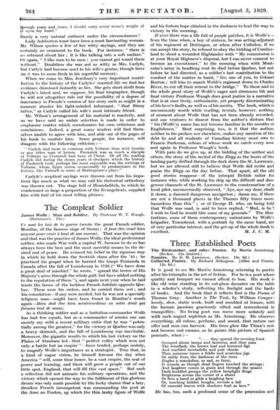The Compleat Soldier James Wolfe : Man and Soldier. By
Professor W. T. Waugh. ( Brent ano 's. 21s. ) Ce soya les lois de la guerre (wrote the great French soldier, Montluc, of the famous siege of Siena) ; it faut gtre cruel bien souvent pour venir a bout de son ennemi . That was the opinion and that was the practice of James Wolfe, the ideal professional soldier, who made War with a capital W, because to do so has always been the best and the most merciful means to the de- sired end of peace. He evinced his belief in the rigorous way in which he held down the Scottish clans after the '45 ; he Practised his gospel when he harried the Gaspe Peninsula in Canada after the fall of Louisbourg in 1758 (" We have done a great deal of mischief," he wrote, spread the terror of His Majesty's arms through the whole gulf, but have added nothing to the reputation of them "), and again next year when he laid waste the farms of the luckless French habitats opposite Que- bec. These were his orders, and lie carried them out ; and his consolation—if any were needed, but he was not a specially religious man—might have been found in Montluc's words again—Dieu dolt Otre bien tnisericordieux en noire droit qui faisons taut de maux.
As a thinking soldier and as a battalion-commander Wolfe has had few equals, but as a commander of armies one can merely say with a recent military critic that he was " poten- tially among the greatest," for the victory at Quebec was only a heavy skirmish, and the fall of Louisbourg was inevitable. Moreover, the gigantic results to which his last victory on the Plains of Abraham led—that " perfect volley which won not only a battle but an empire "—have tended, perhaps unduly, to magnify Wolfe's importance as a strategist. True that, in a kind of vague vision, he himself foresaw the day when America " will, some time hence, be a vast empire, the seat of power and learning, and there will grow a people out of our little spot, England, that will fill this vast space." But such a reflection did not animate his military operations, and the victory which opened the way to the fulfilment of this glorious dream was only made possible by the lucky chance that a lazy, drunken French incompetent was commanding the post at the Anse au Foulon, up which the thin lanky figure of Wolfe and his forlorn hope climbed in the darkness to lead the way to victory in the morning.
If ever there was a life full of purple patches, it is Wolfe's- from the time when, a boy of sixteen, he was acting-adjutant of his regiment at Dettingen, or when after Culloden, if we can accept the story, he refused to obey the bidding of Cumber- land to shoot a wounded Highlander with " My commission is at your Royal Highness's disposal, but I can never consent to become an executioner," to the morning when with Mont- calm's army in headlong rout he died before Quebec, but not before he had directed, as a soldier's last contribution to the conduct of the matter in hand, " Go, one of you, to Colonel Burton ; tell him to march Webb's regiment down to Charles River, to cut off their retreat to the bridge." To these and to the whole great story of Wolfe's eager and strenuous life and final victory Professor Waugh does good justice in a narrative that is at once lively, enthusiastic, yet properly discriminating of his hero's faults, as well as of his merits. The book, which is uncommonly worth while reading, reveals, however, nothing of moment about Wolfe that has not been already recorded, and one ventures to dissent from the author's dictum that " his (Wolfe's) name has not become familiar in the mouths of Englishmen." Most surprising, too, is it that the author, neither in his preface nor elsewhere, makes any mention of the debt he and all students of Canadian history must owe to Francis Parkman, echoes of whose work we catch every now and again in Professor Waugh's book.
With pain do we give up, at the bidding of the author and others, the story of the recital of the Elegy as the boats of the landing-party drifted through the dark down the St. Lawrence, but we are allowed still to believe that Wolfe did recite and praise the Elegy on the day before. That apart, all the old good stories reappear—of the intrepid British sailor for instance who, while working his ship up the difficult and dan- gerous channels of the St. Lawrence to the consternation of a local pilot, unconcernedly observed, "Aye, aye my dear, chalk it down, a damned dangerous navigation ; damn me, if there are not a thousand places in the Thames fifty times more hazardous than this " ; or of George II. who, on being told that Wolfe was mad, is said to have replied, " Mad, is he '1 I wish to God he would bite some of my generaLs." The illus- trations, some of them contemporary caricatures by Wolfe's brigadier, Townshend, with a portrait by the same hand, are of very particular interest, and the get-up of the whole book is


































 Previous page
Previous page